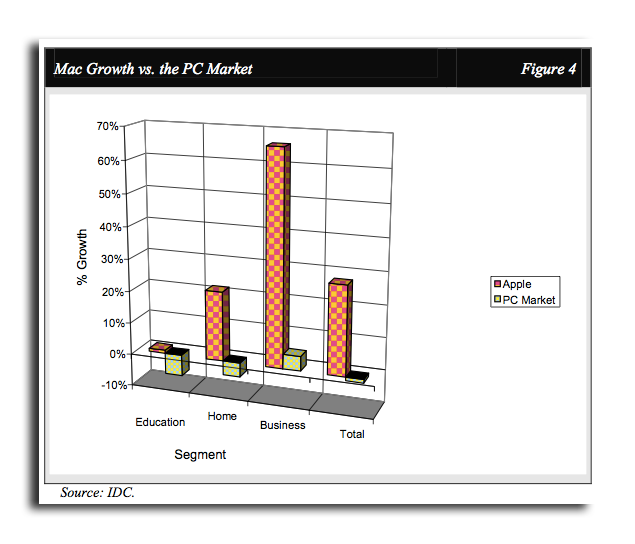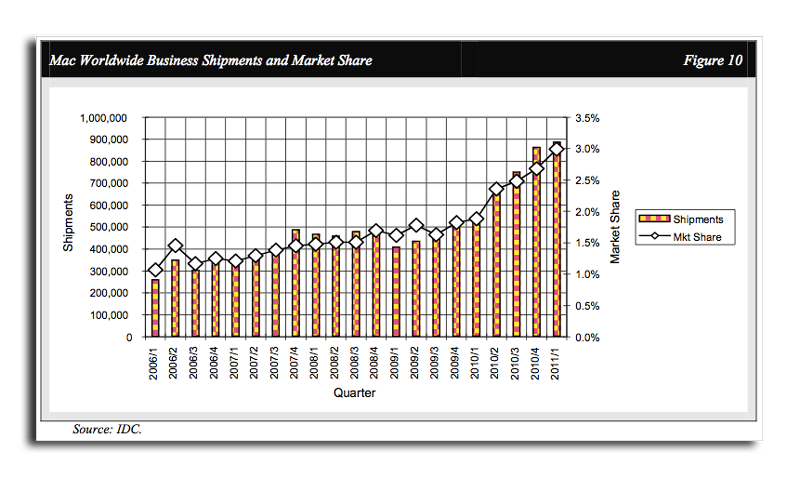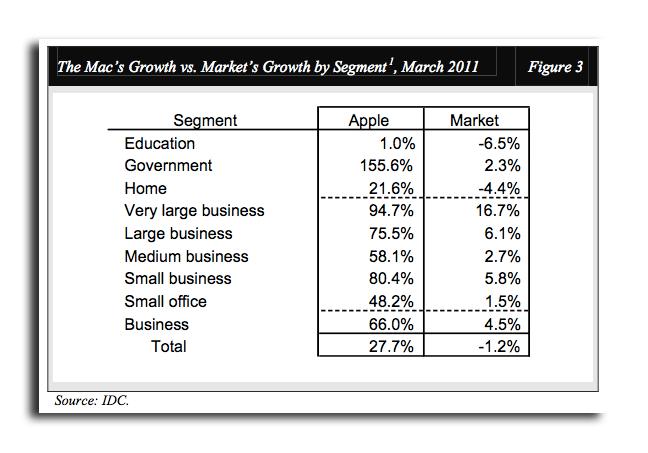Apple makes huge inroads in enterprise as corporate Mac sales surge 66%
The data from Apple's previous fiscal quarter was highlighted on Friday by analyst Charlie Wolf with Needham & Company. He said though he originally viewed success in the enterprise as a "one-quarter blip," it now appears to be a "durable platform" for Apple.
"Mac shipments in the business market grew at a torrid 66.0% pace, an order of magnitude higher than the 4.5% shipment growth rate of the business market," Wolf wrote.
The trend is particularly interesting because between 2007 and 2009, Mac sales in the enterprise stagnated even as the platform was taking off with consumers. The trend has only reversed over the past four quarters.
Mac sales are now estimated to be 3 percent of total PC business sales, which is the highest total Apple has seen since the second quarter of 1997.
Broken down my market segment, Mac shipments grew 94.7 percent in the "very large business" category, 75.5 percent with "large businesses," 58.1 percent with "medium businesses," and 90.4 percent with "small businesses." All of those totals well exceeded growth in the overall PC market.
Apple's newfound success in the enterprise helped the company outpace its already tremendous growth in the consumer market. Last quarter, Mac shipments in the worldwide home market grew 21.6 percent, while the overall PC market dropped 4.4 percent.
Apple also saw a whopping 155.6 percent growth in Mac sales to governments, compared with just 2.3 percent for PCs. And while education sales grew just 1 percent for Apple, the overall market saw sales slide 6.5 percent last quarter.
"Notwithstanding its premium prices compared with Windows PCs, the Mac should continue to grow faster than the PC market, propelled by the halo effects now emanating from the iPod, iPhone and iPad along with the international rollout of Apple Stores," Wolf said.
In its second fiscal quarter of 2011, Apple reported sales of 3.76 million Macs, a year over year increase of 28 percent and the best-ever total for March quarter. Mac sales helped Apple's profits to grow 95 percent in the three-month frame.
During the company's quarterly earnings conference call, Apple Chief Operating Officer Tim Cook acknowledged the success Apple and the Mac platform have had lately in the enterprise, though he did not delve into specific numbers. He did state he believes that the iPad, which has seen swift adoption among major companies, as created a "halo effect" for the Mac, resulting in even more sales for the platform.
 Neil Hughes
Neil Hughes
















 Amber Neely
Amber Neely
 Thomas Sibilly
Thomas Sibilly
 AppleInsider Staff
AppleInsider Staff
 William Gallagher
William Gallagher
 Malcolm Owen
Malcolm Owen
 Christine McKee
Christine McKee









80 Comments
If I had a nickle for every time our IT Director said, "We are a Microsoft shop", I'd be a millionaire. Glad to see Apple moving on and moving in.
I would wager that a good bit of those Mac sales are for organizations who wish to write their own, in-house, custom iOS apps -- especially iPad apps.
The post-pc era is upon us!
Naturally Apple's Macs grew more than PCs. They have less market share.
Naturally Apple's Macs grew more than PCs. They have less market share.
You just can't stand it, can you?
Perhaps corporate America (and the IT Departments) are finally waking up to the reality many of us have known for years: despite higher up-front costs, the long-term cost of ownership of Apple products is significantly less than that of PCs running Windows...
Back in the 90's I worked for one of the major landline companies. I was responsible for deploying (and supporting) 300 PowerMac systems. I had three teammates who collectively supported 100 PCs. Add up the cost of labor and over the three-year lifespan of these systems it's clear that, ultimately, the long-term cost of those PCs (forget the fact that these were very expensive PS/2 machines) was higher.
Here we are 15 years later and PCs are more reliable than they used to be. Still, I purchased my own desktop system three years ago, a $800 Mac Mini. I work on a team of 24 people, all of whom (aside from myself) use HP and Dell laptops. In the past three years, all 23 of them have had their machines out for re-imaging at least once, most of them two or more times, due to corruption. Usually they are without their machines for two days. That's two days of lost productivity. My company does not provide any backup solution for client systems, so having one's system wiped means losing whatever data we do not ourselves back up. It also takes a day or two to get one's system back to being functional.
Multiply 23 people times 5 days of lost productivity, plus the cost of paying the IT support people. Contrast that to a machine that cost $800 and has not had a moment of downtime in three years. Now, which system is cheaper to own?